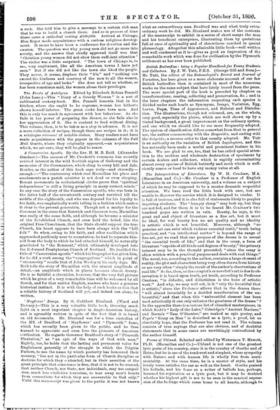Mayflower' Essays. By G. Cuthbert Blaxland. (Ward and Downey.)—This is
a very valuable little book, throwing much light on a most important chapter in Anglo-American history, and is agreeably written in spite of the fact that it is based on old documents. Mr. Blaxland was for a time custodian of the MS. of Bradford of 'Mayflower' and " Plymouth " fame, which has recently been given to the public, and he thus /earned to appreciate and even love the pioneers of American civilisation. He regards Governor Bradford's story of " Plimouth Plantation," as "an epic of the ways of God with man." Rightly, too, he holds that the lasting and permanent value for Englishmen generally of the struggle in which the Pilgrim Fathers, to use the name by which posterity has honoured their memory, "lies not in the particular form of Church discipline or doctrine for which they contended, but in their assertion of the great principle that conscience is free, that it is not to be coerced, that neither Church, nor State, nor individuals, may use compul- sion, much less vindictive terrorism, to tear away men's hearts from connections for which they are answerable to God only." Until this manuscript was given to the public it was not known
what an extraordinary man. Bradford was and what, truly extra- ordinary work he did. Mr. Blaxland makes use of the contents of the manuscript to exhibit in a series of short essays the man and his beneficent enterprises, illustrating them by quotations full at once of spirituality and of shrewdness couched in quaint phraseology. Altogether this admirable little book—well written and well condensed as it is—gives as good an impression of the remarkable work which was done for civilisation by the Plymouth settlement as has ever been published. '










































 Previous page
Previous page